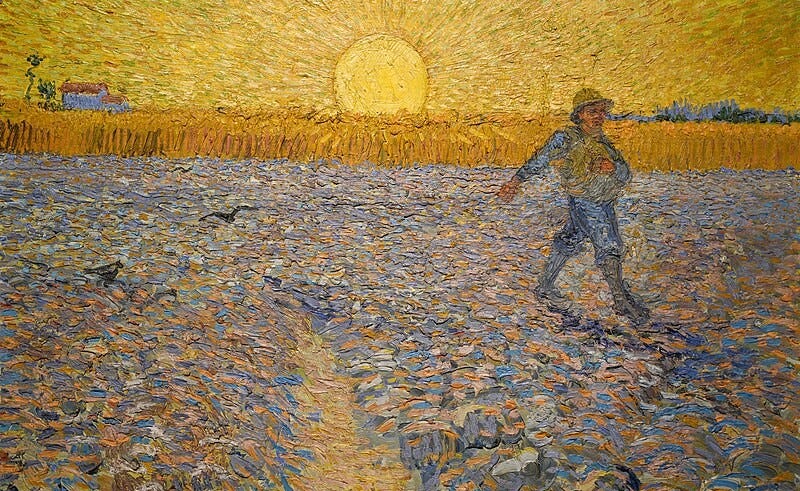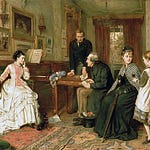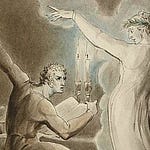In celebration of the two-year anniversary of Word & Song, we are offering a special rate on paid, gift, and upgraded subscriptions all during July. Keep an eye on your inbox for more specials & announcements.
The only air conditioning we ever had when I was growing up was the kind that comes from your pores: sweat, our Word of the Week. How’s that for a summer word? It is an amazing thing, actually. The body has a staggering network of means to keep the blood at that very warm temperature of 98.6 degrees Fahrenheit, and sweat is one of them. What happens then? Unless you’re out in weather that’s like soup, with the air saturated with water vapor, the water on your skin will begin to evaporate. That is, there’s an imbalance, with droplets of water exposed all around to air that “wants” the water. But when the water evaporates, it takes heat with it: or we may say that heat is required to make water evaporate. But much of the heat it gets is right from your body, which the droplet is touching. And that lowers the temperature of your skin. Now, if a breeze is blowing your way, that will speed up the evaporation of the water droplets, because you won’t be sitting there with a little blanket of warm moist air around your body from your having sweated a bit. The “blanket” is whisked away, drier air meets your sweat, and the process doesn’t stall. Even if you’re not sweating, the air that blows past you takes some of your heat with it, and the faster that heat gets exchanged, the cooler you’ll feel, because the cooler your skin will be. I’m told that only two creatures really sweat: man and horse. Those are the only two that can run for a very long time without complete breakdown.
Summer’s a time for sweating, and we have a lot of expressions that have to do with sweat and work you do in the heat. Its first appearance in Scripture comes when God tells Adam that for his sin he will have to labor hard: “In the sweat of thy brow thou shalt eat bread.” That’s become a common expression in English. What it meant in Genesis was difficulty, and as is the case with the other things God says to Adam and Eve, in the curse there is a hidden blessing: Adam will eat bread, what Scripture calls “the staff of life,” and that’s the first appearance of that crucial word, too. Why, Jesus, the bread from heaven, will be born in Beth-lehem, which in Hebrew means “House of Bread,” or as we might say in English, Breadville. Americans have been saying, of a task that’s quick and easy, “It’s no sweat,” and that’s a surprisingly recent coinage. Nobody seems to have said it before around 1950. Another recent coinage is to say that we “sweat somebody,” meaning that we squeeze all the juice out of him, usually by unjust pressure or threats. But it’s been centuries since we in English have been “sweating blood” or other fluids from the body that aren’t real sweat.
Then there was a use of the word that’s disappeared, because the opportunity for it has disappeared. Let me explain. I’ve got a nickel minted in 1883 that is plated with gold. The back of the coin doesn’t have the word “CENTS” on it, just the Roman numeral V. So some enterprising Sons of Adam out west in those days would plate the five-cent piece with gold to pass it off as a five dollar coin. Congress and the mint got wise to the trick, and in the middle of the year they had the engraver add the word “CENTS” so that nobody would be fooled. Anyway, the trick could work only because the important coins were made with precious metals — gold or silver. But that wasn’t the only way a Son of Adam could cheat you with a coin. He could sweat the coins: you put them in a big bag and shake them till you get flecks and specks of silver and gold rubbed or knocked off. The coins will still get the price that’s stamped on them, and you will have a little extra gold or silver to fuse together into a small lump or bar or what have you. Hey, how would it be if these clever people spent as much sweat in doing good as in doing bad? For the life of crime isn’t an easy one — the way may look short and quick, but it’s actually full of potholes and landslides and hairpin turns and other robbers. No sweat? Hardly!
So where does this word sweat come from? It “should” be swot or swat, if we went by the Old English forms and kept the vowels. For the verb swaetan came from the noun, which was first. In the Germanic languages, long before things were written down, if you wanted to turn a noun or an adjective into a verb, you added the suffix -jan to it, with the j there signifying a hard y sound. Make that sound — say ye, ye, ye! Where’s your tongue? High in the mouth, near the palate, and forward too. When you have to pronounce two vowels, one in the first syllable and the other in the second, often what you’re going to do has an effect on what you’re doing right at the moment. That is, you anticipate, and that’s what happened with the vowels in those -jan verbs, in prehistoric English and German: they were moved up front, and then the j, having messed things up, ducked out and slunk away. It’s why we tell a tale and heat something hot and fill something full, so we’d now be sweating swot, except that the -wo- isn’t that easy to say, so the verb sweat eventually took over for the noun swot, and that’s why we sweat sweat. Now that wasn’t so hard, was it? Keep cool, my friends!
Word & Song by Anthony Esolen is an online magazine devoted to reclaiming the good, the beautiful, and the true. We publish six essays each week, on words, classic hymns, poems, films, and popular songs, as well a weekly podcast for paid subscribers, alternately Poetry Aloud or Anthony Esolen Speaks. Paid subscribers also receive audio-enhanced posts and on-demand access to our full archive, and may add their comments to our posts and discussions. To support this project, please join us as a free or paid subscriber. We value all of our subscribers, and we thank you for reading Word and Song!















Share this post